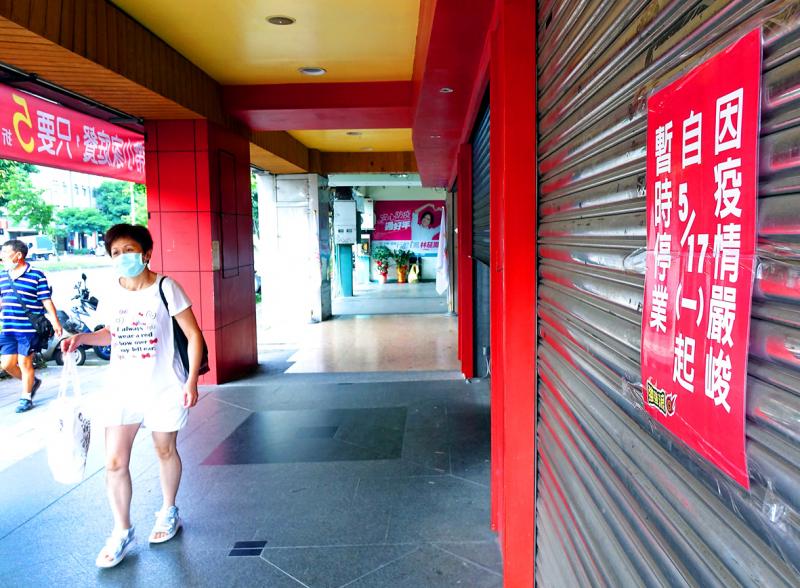There has been a 25 percent increase in job openings in the technology and e-commerce industries over the past two years, while travel-related industries have seen a decline in vacancies of about 30 percent, a representative from job bank yes123 said yesterday.
Since the COVID-19 outbreak, there appears to have been a shift in the jobs available for recent graduates, the job bank said.
People born after the late 1990s could have an advantage when looking for opportunities in science, technology, engineering and mathematics (STEM) fields such as artificial intelligence, cloud services and big data, while people with liberal arts degrees could consider opportunities in digital marketing, Web editing, the mobile payment sector and technology law, it said.

Photo: Chu Pei-hsiung, Taipei Times
As a result of the COVID-19 pandemic, only the technology industry, as well as the stay-at-home economy and industries related to digital transformation, have been more welcoming of recent graduates over the past two years, yes123 assistant manager Yang Tsung-pin (楊宗斌) said.
On the other hand, the hospitality, tourism, hotel and aviation industries have had a relatively tough time, he said.
With the nation this year experiencing a major local outbreak of the disease, the tutor and realtor professions, which were previously popular among recent graduates, have also been negatively affected, he said.
Accordingly, there have been fewer job opportunities, he added.
Estimates show that during the COVID-19 pandemic, opportunities in the e-commerce and technology industries have grown by 25 percent, while the number of openings in businesses such as airlines and hotels have fallen by 30 percent, he said.
Yang said he believes that recent graduates with STEM degrees still possess an advantage over those with liberal arts degrees.
This year, due to people working or attending school remotely, top talent working in areas such as information security, artificial intelligence, cloud services or big data, or even software or electronics, have benefited, he said.
Students who are soon to graduate from college are digital natives, so they have an advantage, he said.
As last year’s college seniors might have postponed their graduation due to COVID-19, and other workers who were put on unpaid leave or let go would also be applying for jobs, students might expect a more competitive job market this summer, he added.
While job vacancies can be expected to increase after the end of the pandemic, young workers still face poor working conditions and low salaries, Taiwan Youth Association for Democracy managing director Alvin Chang (張育萌) said.
The Ministry of Labor should begin making plans to conduct a survey on the work environments of various industries, to provide guidance to high-risk industries on the management of environmental health and safety, and to offer incentives to businesses that want to recruit young workers after the pandemic is over, he said.

The Grand Hotel Taipei on Saturday confirmed that its information system had been illegally accessed and expressed its deepest apologies for the concern it has caused its customers, adding that the issue is being investigated by the Ministry of Justice Investigation Bureau. The hotel said that on Tuesday last week, it had discovered an external illegal intrusion into its information system. An initial digital forensic investigation confirmed that parts of the system had been accessed, it said, adding that the possibility that some customer data were stolen and leaked could not be ruled out. The actual scope and content of the affected data

‘LIKE-MINDED PARTNER’: Tako van Popta said it would be inappropriate to delay signing the deal with Taiwan because of China, adding he would promote the issue Canadian senators have stressed Taiwan’s importance for international trade and expressed enthusiasm for ensuring the Taiwan-Canada trade cooperation framework agreement is implemented this year. Representative to Canada Harry Tseng (曾厚仁) in an interview with the Central News Agency (CNA) said he was increasingly uneasy about Ottawa’s delays in signing the agreement, especially as Ottawa has warmed toward Beijing. There are “no negotiations left. Not only [is it] initialed, we have three versions of the text ready: English, French and Mandarin,” Tseng said. “That tells you how close we are to the final signature.” Tseng said that he hoped Canadian Prime Minister Mark Carney

POSITIVE DEVELOPMENT: Japan and the US are expected to hold in-depth discussions on Taiwan-related issues during the meeting next month, Japanese sources said The holding of a Japan-US leaders’ meeting ahead of US President Donald Trump’s visit to China is positive news for Taiwan, former Japan-Taiwan Exchange Association representative Hiroyasu Izumi said yesterday. After the Liberal Democratic Party’s landslide victory in Japan’s House of Representatives election, Japanese Prime Minister Sanae Takaichi is scheduled to visit the US next month, where she is to meet with Trump ahead of the US president’s planned visit to China from March 31 to April 2 for a meeting with Chinese President Xi Jinping (習近平). Japan and the US are expected to hold in-depth discussions on Taiwan-related issues during the

President William Lai (賴清德) yesterday bestowed one of Taiwan’s highest honors on Saint Vincent and the Grenadines (SVG) Ambassador Andrea Clare Bowman in recognition of her contributions to bilateral ties. “By conferring the Order of Brilliant Star with Grand Cordon on Ambassador Bowman today, I want to sincerely thank her, on behalf of the Taiwanese people, for her outstanding contribution to deepening diplomatic ties between Taiwan and SVG,” Lai said at a ceremony held at the Presidential Office in Taipei. He noted that Bowman became SVG’s first ambassador to Taiwan in 2019 and